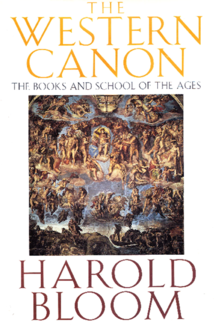漢清講堂的預計大主題:
Wikipedia

Cover of the first edition
| |
| Author | Harold Bloom |
|---|---|
| Country | United States |
| Language | English |
| Subject | Western canon |
| Publisher | Harcourt Brace |
Publication date
| 1994 |
| Media type | Print (Hardcover and Paperback) |
| Pages | 578 |
| ISBN | 978-1-57322-514-4 |
The Western Canon: The Books and School of the Ages is a 1994 book by Harold Bloom on Western literature, in which the author defends the concept of the Western canon by discussing 26 writers whom he sees as central to the canon. The Western Canonis Bloom's best-known book alongside The Anxiety of Influence(1973), and was a surprise bestseller upon its release in the United States.
Contents
[hide]Summary[edit]
Bloom defends the concept of the Western canon by discussing 26 writers whom he sees as central to the canon:[1][2]
- William Shakespeare
- Dante Alighieri
- Geoffrey Chaucer
- Miguel de Cervantes
- Michel de Montaigne
- Molière
- John Milton
- Samuel Johnson
- Johann Wolfgang von Goethe
- William Wordsworth
- Jane Austen
- Walt Whitman
- Emily Dickinson
- Charles Dickens
- George Eliot
- Leo Tolstoy
- Henrik Ibsen
- Sigmund Freud
- Marcel Proust
- James Joyce
- Virginia Woolf
- Franz Kafka
- Jorge Luis Borges
- Pablo Neruda
- Fernando Pessoa
- Samuel Beckett
Bloom argues against what he calls the "School of Resentment", which includes feminist literary criticism, Marxist literary criticism, Lacanians, New Historicism, Deconstructionists, and semioticians. The Western Canon includes four appendices listing works that Bloom at the time considered canonical, stretching from earliest scriptures to Tony Kushner's Angels in America. Bloom would later disown the list, saying that it was written at his editor's insistence and distracted from the book's intention.[3]
沒有留言:
張貼留言